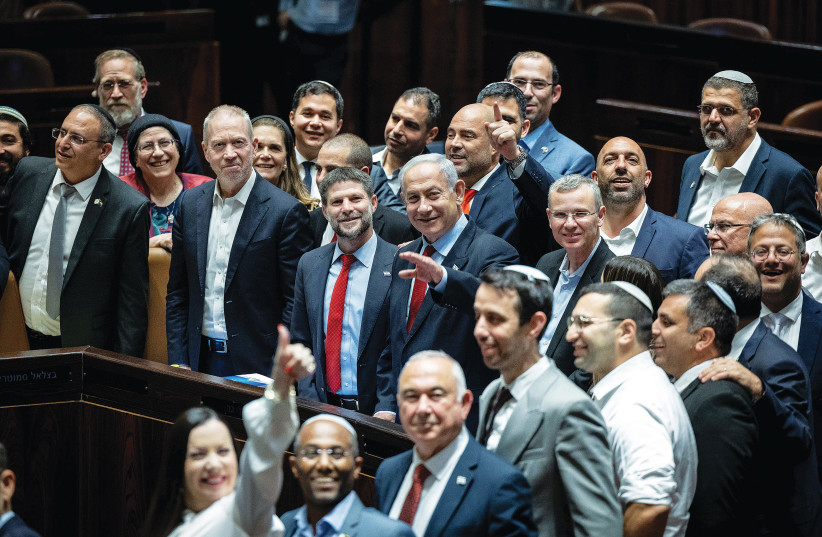The coalition didn’t cave. It passed a budget supported by all of its 64 members. Those fearing yet another round of elections can breathe a sigh of relief. Elections are not likely anytime soon.
With a two-year budget in place, the government can now focus on its main goals: Preventing a nuclear Iran, expanding peace in the Middle East and driving economic growth amid global uncertainties.
There will also be room for legal reform. While there is a clear need for substantial reform to achieve a better balance of power among the branches of government, swift and sweeping legislation to reverse a 30-year gradual judiciary power grab proved problematic, some would even say shortsighted.
Compromise is crucial and implementing the needed reforms will take time. But the push for reform has not been in vain. It now clearly reflects the will of the people or at least a large majority of the people. For it to pass, it will also need to secure individual and minority rights.
The budget creates stability, enables overarching national goals
Government stability paves the way for compromise and consensus-driven legal reforms that establish a fair and balanced system of checks and balances within Israel’s unique political reality and democratic structure. While progress may be more gradual than originally planned, those overly eager for change should remember the grim reality of just a few months ago.

True to form, the media has criticized the government and its budget for being sectorial and snubbing the increasing cost of living in Israel. That will indeed be a test for the government in the years to come, but most of the shortsighted critiques fail to recognize how the budget can spearhead overarching national goals that will boost the economy.
A significant portion of the budget is allocated to streamlining transportation and large-scale infrastructure projects that will connect communities across the country and eliminate disparities. The term “periphery” can become obsolete in the tiny Jewish state with better job opportunities for more people.
Moreover, the modernized rail system will be able to connect commuters and more importantly cargo beyond Israel’s borders, fostering closer ties and promoting peace with neighboring countries. By circumventing maritime bottlenecks and the distress of the high seas, goods and services can be efficiently exchanged throughout the region and beyond in the not-so-distant future.
FOLLOWING FIVE national elections within two years, stability is of paramount importance. Both friends and foes of Prime Minister Benjamin Netanyahu’s sixth government, at home and abroad, realize that political stability is at hand. This government is here to stay.
Peace and prosperity are within reach
The recent invitations extended to the prime minister by the United Arab Emirates ambassador to Israel, as well as the bipartisan calls for a state visit to Washington from House Speaker Kevin McCarthy, Republican presidential candidates and leading Democrats are not mere coincidences.
The Netanyahu government will face ongoing challenges from political actors and influential special interest groups. The delay in President Joe Biden’s invitation to the prime minister to visit the White House is disappointing. Some see it as disrespectful. Anyone who recognizes the importance of the strong alliance between the United States and Israel also recognizes the importance of the invitation. With stability now in place, there are compelling reasons to believe that the invitation is on its way.
The White House, and particularly the State Department, need to understand that geopolitical vacuums don’t exist. If the United States fails to lead, other powers will quickly step in to fill the void. The recent agreements brokered by China and Russia between Saudi Arabia and Iran serve as a testament to this rule.
As the only true democracy in the Middle East, Israel remains, as Alexander Haig once said, “the largest American aircraft carrier in the world that cannot be sunk.” The US remains the leading global power in an increasingly competitive bipolar world, with China vying for dominance. While the US should take the lead in peace efforts in the Middle East, interested parties in the region will not necessarily wait for America.
A peace agreement, or even a transparent peace process involving Israel, Saudi Arabia and other Muslim nations, would represent a significant milestone in resolving the Arab-Israeli conflict and alleviating tensions between Muslims and Jews. This would benefit all peace-loving people.
Shortly after the budget was passed, thousands of Israeli Muslims began booking flights for next month’s Hajj pilgrimage in Mecca, Saudi Arabia. This quite simply was an unimaginable scenario until now.
The potential for peace and prosperity is boundless. Stability will help realize its fruits.
The writer is a former head of the International Institute for Counter-Terrorism’s office in Washington and a senior analyst at Acumen Risk Ltd., a risk management firm.
